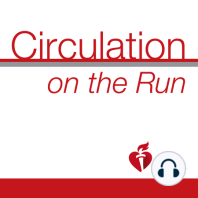17 min listen
Circulation December 17, 2019 Issue
ratings:
Length:
20 minutes
Released:
Dec 16, 2019
Format:
Podcast episode
Description
Dr Carolyn Lam: Welcome to Circulation on the Run, your weekly podcast summary and backstage pass to the journal and it's editors. I'm Dr Carolyn Lam, Associate Editor from the National Heart center and Duke National University of Singapore. Dr Greg Hundley: And I'm associate editor, Dr Greg Hundley, from VCU Health, the Pauley Heart Center, in Richmond, Virginia. Well Carolyn, our feature discussion, are results from the Odyssey study and they're presented by Professor Wouter Jukema from Leiden University Medical Center, regarding the relationship between ultra-low LDL levels in both ischemic and hemorrhagic stroke. The study really seeks to answer the question related to concerns that ultra-low LDL levels, less than 15 milligrams per deciliter, in patients treated for ischemic heart disease could increase the risk of hemorrhagic stroke, but more to come on that intriguing question. Carolyn, how about your first paper? Dr Carolyn Lam: It's from doctors Condorelli and Kallikourdis from Humanitas Clinical and Research Center and Institute of Genetic and Biomedical Research respectively in Rozzano Milan in Italy. Now, these authors used single cell RNA sequencing to map the cardiac immune composition in the standard Murine non ischemic pressure overload heart failure model. They then integrated their findings using multi parameter flow cytometry, immunohistochemistry and tissue clarification immunofluorescence in both the mouse and the human. And they found that despite the absence of infectious agents or an autoimmune trigger, induction of disease led to immune activation that involved far more cell types than previously thought. And that included neutrophils, B cells, natural killer cells, and mast cells. And this really opens up the field of cardio immunology to further investigation using toolkits that have already been developed to study these immune subsets. Dr Greg Hundley: Ah, so Carolyn, do they have any specific examples? Dr Carolyn Lam: Hmm, indeed they did. They found that activation lead to up regulation of key subset specific molecules such as pro inflammatory cytokine onco statin M in pro-inflammatory macrophages, and PD1 in T regulatory cells. Now these are significant because they may help to explain clinical findings such as the refractivity of heart failure patients to anti TNF therapy and cardio toxicity during anti PD1 cancer immunotherapy respectively, for the more these subset specific molecules may become useful targets for the diagnosis or therapy of heart failure. Dr Greg Hundley: Oh, beautiful. Well Carolyn, my next article is from Ambarish Pandey from University of Texas Southwestern Medical Center and it's entitled Incorporation of Biomarkers into Risk Assessment for Allocation of any Hypertensive Medication, According to the 2017 ACC, AHA High Blood Pressure Guidelines, a Pooled Cohort Analysis. Dr Carolyn Lam: So I suppose asking does consideration of troponin or BNP inform cardiovascular risk in those with hypertension? Dr Greg Hundley: Great question Carolyn. So in this study, the authors included participant level data from 12,987 participants across three cohort studies, ERIC, the Dallas Heart Study and MESA. And they were pooled excluding individuals with prevalent cardiovascular disease and those taking antihypertension medications at baseline. Participants were analyzed according to blood pressure treatment group from the 2017 ACC AHA Blood Pressure Guideline and those with high blood pressure, 120 to 159 millimeters of mercury, were further stratified by biomarker status. Dr Carolyn Lam: Okay. So what did they find Greg? Dr Greg Hundley: Participants with elevated blood pressure or hypertension, not recommended for any hypertensive medication with versus without either elevated high sensitivity, cardiac troponin T or N terminal pro BNP, had a 10-year cardiovascular incidence rate of 11% and 4.6%, with a 10-year number needed to treat to prevent one event for intensive blood pressure lowerin
Released:
Dec 16, 2019
Format:
Podcast episode
Titles in the series (100)
Circulation January 24, 2017 Issue: Circulation Weekly: Your Weekly Summary & Backstage Pass To The Journal by Circulation on the Run
